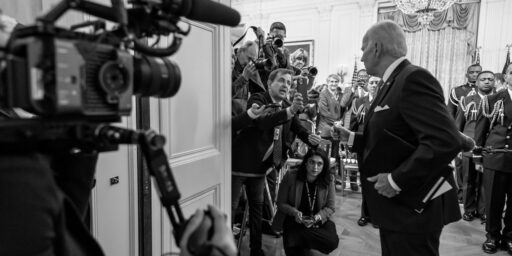Reporters and Bloggers: Synergies and Divergencies
Robert Worth had a piece in yesterday’s NYT noting that the proliferation of online information has driven a cottage industry of online experts who journalists must rely on.
Journalists in Iraq are far too busy with the perils of on-the-ground reporting to sit at screens for hours browsing for terrorist Internet traffic. That is why the new array of online expertise has become an essential tip sheet for them. A whole new mini-industry of instantaneous translation and analysis has arisen, and it often erodes the traditional distinctions between credentialed foreign policy experts and mere amateurs.
Some of the groups are well-known and generously financed outfits like the Middle East Media Research Institute, or Memri, whose primary function is to translate Arabic and Muslim media. But among the best informed are one-person shows — a driven Arabist with a bedside computer. They gain access to terrorist Web sites, sometimes by posing as terrorists themselves, and translate jihadist communiqués and chatter that would not otherwise be available. Others write blogs, translating and commenting on terrorism and politics in general.
Most of these analysts are unknown to the reading public. But that is changing. Last month, Rita Katz, founder of the SITE Institute, was profiled in The New Yorker. (A terrorist Web site that her group monitors promptly posted a link to the article.) And Juan Cole, a University of Michigan historian with a blog about Iraq and the Middle East, became involved in a dispute about a translation of a comment by Iran’s president, Mahmoud Ahmadinejad. Many felt the comment was a direct threat to Israel, but Mr. Cole did not.
For reporters, all this freelance sleuthing and interpreting is a welcome new resource. But like the 17th-century dragomans who were the first official translators between the Islamic world and the West, the analysts often disagree among themselves, leaving the journalists with their own interpretive challenges. “Now the problem is almost one of information overload,” said Gregory Gause, the director of the Middle East Studies program at the University of Vermont. “How does one choose among such a variety of interpreters?”
I find it rather amusing that Worth contrasts the hard working reporter “” with those writing on the ‘Net. Far more important, as Cori Dauber points out, is that few reporters have any real expertise. “[W]ould it kill them to admit for once that the problem isn’t simply a lack of time, but that they lack even the rudimentary background to sort out the various analysts on offer?”
Indeed, the problem here is that Worth and most others in the mainstream press lump “bloggers” into a single category in the way that they wouldn’t for full-time reporters. Surely, a longtime Middle East or Defense correspondent for a major media outlet has more credibility when discussing the Iraq War, the state of the military, and similar matters than a Lifestyle reporter for the Chattanooga Freee Press? Similarly, scholars who study terrorism for a living and also write about it for a popular audience on the Internet have more authority than some high school kid spouting off on mySpace.
Further, that even knowledgable sources differ should hardly be an insurmountable obstacle for decent journalists. That’s true of all manner of public policy issues. Studies from RAND, Cato, Heritage, and Brookings are likely to differ in the sources used and points emphasized. Somehow, reporters manage to cover these issues–although, granted, often not particularly well. Still, this is not exactly a new issue.
Reporters like to point out that bloggers and other analysts rely on their work in order to do what we do. For political and foreign affairs bloggers, at least, that’s certainly true. But it’s also true that reporters are very seldom possessed of much expertise in their beats. They therefore have to rely on subject matter experts. Those folks, increasingly, are posting their thoughts online. This is synergistic, not antagonistic.
UPDATE: Marc Lynch, a tenured Williams College IR prof profiled in Worth’s piece for his blogging at Abu Aardvark, reflects on the decidedly mixed nature of being a public intellectual.
UPDATE: Jay Rosen has a somewhat related piece in today’s WaPo, discussing various effects blogs and other Internet media have on the traditional outlets. Among his points:
The “closed” system of gates and gatekeepers has been busted open. […] Yesterday there were a few dozen providers; today news, views and attitudes stream through millions of gates. And the Web accepts all kinds of gatekeepers, each with unique rules for what matters, rather than the rules adopted by a class of professionals with set journalistic principles. For the old gatekeepers that’s a big disruption.
[…]
Sources have more power to sidestep journalists. What goes for consumers goes for sources. Because sources can be publishers too, there’s a new balance of power between them and reporters, who once gave those sources a voice in the press.
Much more at the link.





There are no “journalists” in the MSM.
Actually, if you put the scare quotes on it, that’s exactly what they are. The word without scare quotes is the one that doesn’t apply.